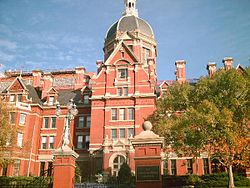Politics get in the way.
Hospitals that have medical residency training programs (this includes trainees in internal medicine, surgery, and all other specialties) are responsible for paying the salary and benefits of their residents. In turn the hospitals bill and are reimbursed by Medicare which is where the government housed the responsibility for supporting and financing graduate medical education. In 1997 the government capped the number of residents for which it would reimburse each teaching hospital. All residents in excess of this cap must be supported by the hospital without any government subsidy. (Keep in mind that residents cannot bill for their services.) Hospitals with no existing residencies can initiate new training programs and receive reimbursement but there is no pathway to obtain this support for adding residents to existing programs. Given the lack of governmental interest in increasing the Medicare budget it’s not surprising that there is no appetite for expanding financial support for training programs no matter growth in the population needing health care in any particular location.
Actually, this situation could be worse. From time to time a politician has proposed taking the financial responsibility out of Medicare and putting it in the general budget to be assessed, debated and determined anew each year. This would leave all teaching hospitals unsure how many residents would be covered each year until the budget was announced. Planning would be impossible. And, of course, hospitals with more political clout because of the strength of their particular representatives would do better than those with less powerful or interested senators or congressmen.
This inability to obtain financial support is harmful to the future of health care for several reasons. Residents provide much of the care for indigent/uninsured patients in inner city hospitals for example. Also important is the need to grow physician numbers to keep pace with the ever increasing population.



